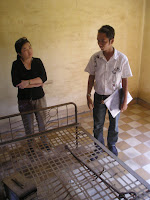Suicides among the aging east and west
Two separate headlines in today's Straits Times caught my attention. In the World section, the article from Reuters, More baby boomers take their own lives in US , summarizes a report by two sociologists on a growing trend in suicide rates in America. The article specifically noted a trend among white baby-boomer men, who do not have college degrees. While figures were not given in this short article, it did emphasize that the increase is a break from the norm, where the middle-aged are usually at low risk for suicide due to family roles. Possible factors for these aging baby-boomers is that baby-boomers tend to be the least healthy aging population, and with rising unemployment in these slow economic times, an increasing number in this cohort are simply unable to cope with rising costs. There was another, comparable article in the Asia section, More elderly in China killing themselves , which reported that among urban people between 70 and 74 the suicide rate "surged abo...
